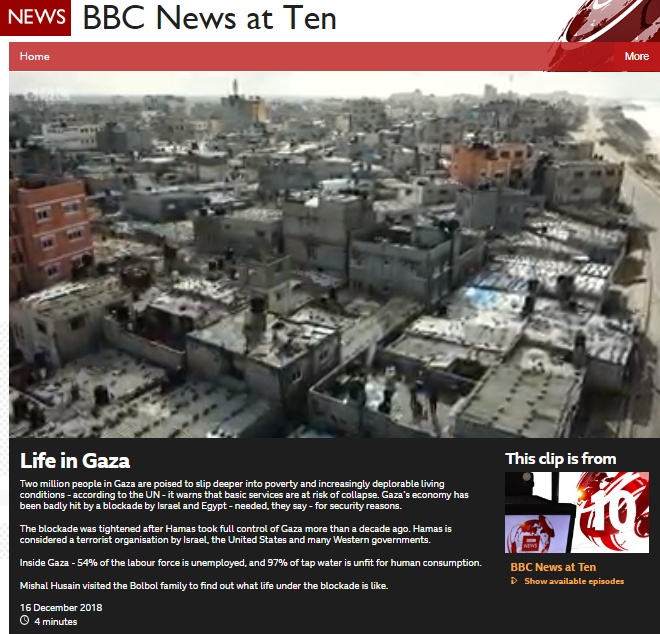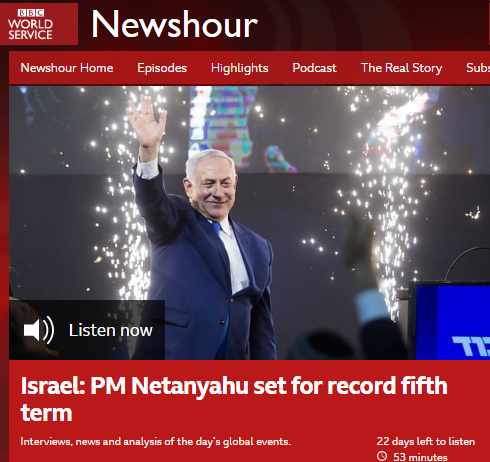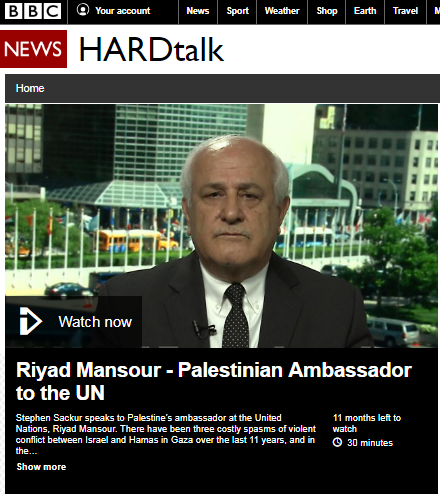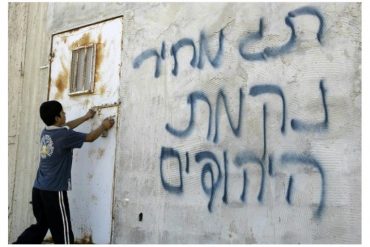The December 16th edition of ‘News at Ten’ – aired on BBC One and the BBC News channel – included a report titled ‘Life in Gaza’ by Mishal Husain who was scheduled to report from the Gaza Strip the following morning for BBC Radio 4’s ‘Today’ programme.
“Two million people in Gaza are poised to slip deeper into poverty and increasingly deplorable living conditions – according to the UN – it warns that basic services are at risk of collapse. Gaza’s economy has been badly hit by a blockade by Israel and Egypt – needed, they say – for security reasons.
The blockade was tightened after Hamas took full control of Gaza more than a decade ago. Hamas is considered a terrorist organisation by Israel, the United States and many Western governments.
Inside Gaza – 54% of the labour force is unemployed, and 97% of tap water is unfit for human consumption.
Mishal Husain visited the Bolbol family to find out what life under the blockade is like.” [emphasis added]
Unsurprisingly, Husain followed the usual format seen in BBC reporting from the Gaza Strip: high on pathos and slogans, low on facts and context. [emphasis in bold added]
Husain: “It’s a densely populated strip of land. A place that the United Nations has warned could be unlivable by 2020. One of the most acute problems is a shortage of clean water – something that Maher Bolbol needs not only at home but for his business. It’s a coffee stall where he makes the equivalent of just £2 a day. Gaza’s economy is at a standstill; badly affected by years of a blockade by Israel and Egypt – they say for security reasons.”
Gaza’s water problems of course have nothing to do with the counter-terrorism measures imposed by Israel and Egypt following Hamas’ violent take-over of the territory in 2007. Those problems stem from excessive pumping from the aquifer by the local population and attempts to alleviate them by means of foreign-funded desalination plants have been thwarted by Hamas and by internal Palestinian disputes.
With Husain failing to make any mention of the terror attacks against Israeli civilians which are the reason for the implementation of restrictions on the import of dual-use goods into the Gaza Strip, viewers then heard from her main interviewee.
Maher Bolbol [voiceover] “This blockade is like a cancer in the whole Gaza Strip. It spread and affects everyone and of course it’s endurable unless the blockade is lifted.”
Husain: “Today the World Bank says half of Gaza’s population is living in poverty. This is the busy home of a big family – the grandparents, their sons and daughters, their sons and daughters-in-law and all the grandchildren. But of course in a place like this that means many mouths to feed and it’s not easy to provide for such a large family in Gaza. The household is 21 people in all, living here since 2014 when their old home was destroyed in an Israeli airstrike. There are three generations under this roof but Maher is the only one who has any work at all.”
Viewers were not told where the family’s “old home” was or why it was allegedly “destroyed in an Israeli airstrike”.
Khadra Bolbol [voiceover]: “No clothes, no furniture. It’s barely enough for food and water and sometimes we can’t even find that.”
Husain: “This is the only existence the children know. But for the generation in the middle – their parents – dreams of jobs and livelihoods have been shattered.”
Alaa Bolbol [voiceover]: “It is sad to have to drop out of university. I thought I was going to make something of myself, that people would call me Alaa the accountant. Now I find myself unable to pull myself out of the hole I fell into.”
Husain: “He has a wife and child but no means of supporting them. His unpaid debts meant he had to go to prison. Now Maher has a new worry – another son went to the weekly demonstrations near Gaza’s boundary with Israel and was hit by a rubber bullet.”
In compliance with standard BBC editorial policy, Husain described eight months of violent rioting that has included shooting attacks, arson attacks, grenade attacks, IED attacks and border infiltrations in which a high proportion of people connected to terror organisations have been killed or injured as “demonstrations”.
Mohammed Bolbol [voiceover] “All young adults go and take part. I went there just like the rest of them, like anyone does. God willing the blockade will be lifted, then we will find jobs, live our lives and secure a future for our children.”
Maher Bolbol [voiceover]: “After the injury of course I’m upset. This is my son, I raised him. I’m scared for him. I also know that this will be an added burden to us as a family.”
Husain: “Tonight there is fresh bread even if scrap paper is the only available fuel. And few believe the blockade can end while Hamas – whose founding charter denies Israel’s right to exist – is in power here. When I’ve talked to Israeli officials and ordinary people they have said that Gaza is in this position because of Hamas. What do you think of that?”
Maher Bolbol [voiceover]: “No, our internal Palestinian governments cannot be held responsible. The siege that was imposed is really strangling us.”
Making no effort to clarify to BBC viewers that the counter-terrorism measures are not a “siege” and that they were implemented because of Hamas’ terror attacks against Israeli civilians, Husain closed her report with a brief and opaque tick of the ‘impartiality’ box.
Husain: “But as well as the blockade incomes here have been affected in the last year by Palestinian divisions; sanctions imposed on Hamas by the Palestinian Authority in the West Bank. Maher’s family like many others here say they have little real hope of a better future.”
On the day that the BBC aired this report Hamas staged a rally in Gaza to mark 31 years since its founding. According to documents obtained by Israeli journalists, the cost of that rally amounted to over half a million dollars. BBC audiences of course heard nothing about that or about the highly relevant topic of Hamas’ long-standing diversion of funds and resources for the purpose of terror at the expense of the Gaza Strip’s civilian population.
Instead – and notwithstanding Husain’s few half-hearted ticks of the ‘impartiality’ box’ – BBC audiences were once again steered towards the view that the root cause of the problems faced by civilians in the Gaza Strip is the counter-terrorism measures that had to be implemented due to Hamas terrorism – the “blockade” – rather than Hamas terrorism itself.
Related Articles:




